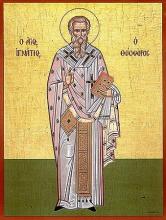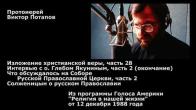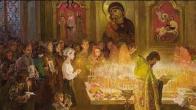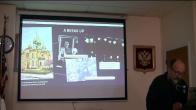You are here
Hieromartyr Ignatius the God-bearer
20 December/2 January & 29 January/11 February
 St. Ignatius the God-bearer is of particular importance to us, for he was close to the Apostles, heard the teachings of Christianity from them directly, and was an eyewitness to the spread and development of the first Christian communities. In his seven Epistles, he provided us with an impression of the Apostolic era.
St. Ignatius the God-bearer is of particular importance to us, for he was close to the Apostles, heard the teachings of Christianity from them directly, and was an eyewitness to the spread and development of the first Christian communities. In his seven Epistles, he provided us with an impression of the Apostolic era.
St. Ignatius was born in Syria, toward the end of the Savior's earthly life. We learn from the account of St. Ignatius' life that he had been that youth whom the Lord took into his arms and said "Except ye be converted, and become as little children, ye shall not enter into the Kingdom of Heaven." (Matthew 18:3) He is known as «God-bearer» because, with his profound love for the Lord, it was as if he was carrying Him in his heart. St. Ignatius was a disciple of the Holy Apostle and Evangelist John the Theologian. From St. Ignatius' Epistle to the Smyrnians, it is evident that he was particularly close to the Holy Apostle Peter, accompanying him on a number of his apostolic journeys. Shortly before the destruction of Jerusalem in the year 72 AD, Evod, one of the 70 Apostles of Christ, reposed, and Ignatius took his place as bishop of Antioch, the capital city of Syria.
St. Ignatius administered the Church of Antioch for 40 years (67-107 AD). In a vision, he was made worthy to witness Divine Services in Heaven, and to hear Angelic chant. Following the example he had witnessed in the Angelic world, he introduced into the Divine Services antiphonal chant, in which two choirs sing in turn, as if calling to one another. From Syria, this type of chant quickly spread throughout the early Church.
In the year 107, during a campaign against the Armenians, Emperor Trajan was passing through Antioch. He was told that Holy Hierarch St. Ignatius was of the Christian confession, that he taught disdain for wealth, observance of celibacy, and not offering sacrifice to the Roman gods. The Emperor summoned the Holy Hierarch and demanded that he cease to preach about Christ. When the Elder refused, he was sent in shackles to Rome, where he was sent to the Coliseum to be torn apart by wild beasts for the amusement of the crowd. On the way to Rome, he wrote the seven Epistles that have survived to our days. In his Epistle [to the Romans], St. Ignatius asks Christians not to try to save him from death. «I entreat you, do not unseasonably befriend me. Suffer me to belong to the wild beasts, through whom I may attain unto God. I am God's grain, and I am ground by the teeth of wild beasts, that I may be found pure bread. » Upon hearing of the Holy Hierarch's courage, Trajan put an end to persecuting Christians. St. Ignatius' relics were translated to Antioch, but later were returned to Rome and placed in the Church of Hieromartyr St. Clement, Pope of Rome.
In his Epistle to the Ephesians, St. Ignatius writes, "...they who profess to be Christ’s shall be apparent by their deeds...." He states, «...hold fast perfectly your faith and love in Jesus Christ, for these are the beginning and the end of life. The beginning is faith, the end is love. And the two blending in unity are God, and all else follows on these, ending in perfect goodness. No man who professes faith lives in sin, nor if he possesses love, does he live in hatred. »
Relics in cathedral - monthly calendar
| S | M | T | W | T | F | S |
|---|---|---|---|---|---|---|
|
|
1
|
2
|
3
|
4
|
5
|
6
|
|
7
|
8
|
9
|
10
|
11
|
12
|
13
|
|
14
|
15
|
16
|
17
|
18
|
19
|
20
|
|
21
|
22
|
23
|
24
|
25
|
26
|
27
|
|
28
|
29
|
30
|
|
|
|
|
PARISH LIFE
RECENT VIDEOS
Address of our Cathedral
Subscribe to our mailing list
While all the materials on this site are copyrighted, you may use them freely as long as you treat them
with respect and provide attribution on the Russian Orthodox Cathedral of St.John the Baptist of Washington DC.









